|

the library across the Tay
photo - mw
_______________________
Dog’s Walking Song
José Luis Rey
translated from the Spanish by David Francis
I will eat clouds with you, my famous Verónica.
It will be the night of sirens, of police searching
empty apartments for a starfish,
of the bird that wanted to be a girl.
It will be the day when the school flew.
The bicycles, the rollerblades
have worn down the moon and you don’t come
for teatime at home when it snows. Don’t you know?
I see a forest spinning in the washing machine.
But whenever you want, when you say so,
I will eat with you the hot apples
that tell us: time is a dream, too, the lost fisherman
who in the heavens made of linen wouldn’t know how to read my cards anymore.
Just a bit, a story, a small fragment.
...(more)
_______________________
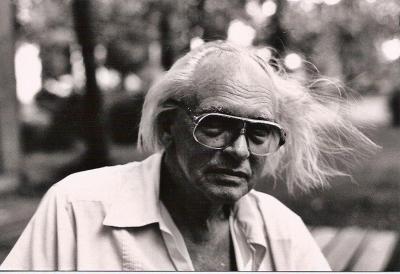
Al Purdy
December 30, 1918 – April 21, 2000
Wilderness Gothic
Al Purdy
Across Roblin Lake, two shores away,
they are sheathing the church spire
with new metal. Someone hangs in the sky
over there from a piece of rope,
hammering and fitting God's belly-scratcher,
working his way up along the spire
until there's nothing left to nail on---
Perhaps the workman's faith reaches beyond:
touches intangibles, wrestles with Jacob,
replacing rotten timber with pine thews,
pounds hard in the blue cave of the sky,
contends heroically with difficult problems of
gravity, sky navigation and mythopeia,
his volunteer time and labor donated to God,
minus sick benefits of course on a non-union job---
Fields around are yellowing into harvest,
nestling and fingerling are sky and water borne,
death is yodeling quiet in green woodlots,
and bodies of three young birds have disappeared
in the sub-surface of the new county highway---
That picture is incomplete, part left out
that might alter the whole Dürer landscape:
gothic ancestors peer from medieval sky,
dour faces trapped in photograph albums escaping
to clop down iron roads with matched grays:
work-sodden wives groping inside their flesh
for what keeps moving and changing and flashing
beyond and past the long frozen Victorian day.
A sign of fire and brimstone? A two-headed calf
born in the barn last night? A sharp female agony?
An age and a faith moving into transition,
the dinner cold and new-baked bread a failure,
deep woods shiver and water drops hang pendant,
double yolked eggs and the house creaks a little---
Something is about to happen. Leaves are still.
Two shores away, a man hammering in the sky.
Perhaps he will fall.
"At The Quinte Hotel"Al Purdy Starring Gord Downie youtube_______________________

photo - mw
_______________________
Beginning 'We the Migrating They'
Nathaniel Mackey
Blackbox Manifold
—andoumboulouous étude—
We the migrating they we
instigated, those in whose
name we went. To get where
they were going and lie
down
was all we wanted, love’s
choric voices convening,
caroling home, home ex-
ploded long since… It was
up and be gone again,
crab
shell taken for sun where
there was no sun, without
or about hope no one could
say…
We the migrating they we
stared out at, prodigal wish to
burn elsewhere intransigent,
Stella’s high skylight were
Stella
suddenly one of us, she the
one who said move on…
They were not the dead
but
dolls of the dead, a dream of
coming back as we were going.
Eyes wide but eyes nothing
looked
out from, effigies adrift in the
dark…
A parsed pomp and circumstance
it was, not being there but the
image of being there what they
were caught in, lagleg retreat,
emic
advance… Inside the bubble
the house became we saw each
awake one, puffed-up
ascendance all there was of
com-
ing back, an effigy of each if
not
each its own effigy, each an un-
likely remit… Everyone someone
we
knew, resemblance mocked us,
faces doll hard, clavicles crossed.
Each with a big mouth, telling on
everyone, what so-and-so did,
what
so-and-so thought… Who they
otherwise were we fell away from,
equate their going with our going
though we did… Who they were
they
otherwise were, the away what there
was
of it still
...(more)
Nathaniel Mackey at EPC and PennSound
_______________________
The Rain and the Reckoning
William Rivers Pitt
You may have noticed the sudden lack of attention paid to the Occupy movement, now that the gendarmes of the status quo have wielded their truncheons and rolled up the encampments like so many windowshades. Nightly reports by the "mainstream" news media about Occupy actions all across the country have dwindled to almost nil, and for those so disposed, this is a good thing. The roused rabble have been crushed and scattered, and all this talk of inequality and justice can finally be replaced with what has for so long now been the real American anthem: everything is fine, nothing to see here, your betters are in control, go back to work. The uprising has been quelled, it would seem, and it is time to consign the Occupy movement to the dustbin of history.
Nothing, but nothing, but nothing, could be further from the truth....(more)
_______________________
Textual Conspiracies: Walter Benjamin, Idolatry, and Political Theory
James Martel
google books
mediafire pdf
_______________________
The Coming War on General Computation
Cory Doctorow
Transcribed by Joshua Wise
... like the nursery rhyme lady who swallows a spider to catch a fly, and has to swallow a bird to catch the spider, and a cat to catch the bird, and so on, so must a regulation that has broad general appeal but is disastrous in its implementation beget a new regulation aimed at shoring up the failure of the old one. Now, it's tempting to stop the story here and conclude that the problem is that lawmakers are either clueless or evil, or possibly evilly clueless, and just leave it there, which is not a very satisfying place to go, because it's fundamentally a council of despair; it suggests that our problems cannot be solved for so long as stupidity and evilness are present in the halls of power, which is to say they will never be solved. But I have another theory about what's happened. _______________________
We Are Not All Created Equal
The truth about the American class system
Stephen Marche
There are some truths so hard to face, so ugly and so at odds with how we imagine the world should be, that nobody can accept them. Here's one: It is obvious that a class system has arrived in America — a recent study of the thirty-four countries in the Organization for Economic Cooperation and Development found that only Italy and Great Britain have less social mobility. But nobody wants to admit: If your daddy was rich, you're gonna stay rich, and if your daddy was poor, you're gonna stay poor. Every instinct in the American gut, every institution, every national symbol, runs on the idea that anybody can make it; the only limits are your own limits. Which is an amazing idea, a gift to the world — just no longer true. Culturally, and in their daily lives, Americans continue to glide through a ghostly land of opportunity they can't bear to tell themselves isn't real. It's the most dangerous lie the country tells itself....(more)
_______________________

photo - mw
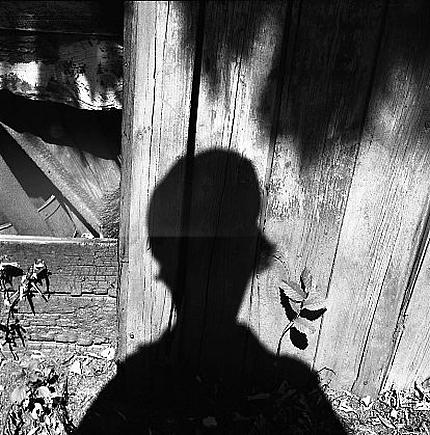
Self-Portrait
(Shadow on Wood)
ca. 1960s
Vivian Maier
Steven Kasher Gallery
(....)
What makes Maier unique is that her pictures were made for no one, not even herself. They weren't printed at all. They are pure witness. She records but never plays back. Her pictures have no intention but to represent what her curiosity and her feelings demand. That demand must have been pressing indeed, to generate so much meticulous work.
(....)
_______________________
Corporeal Order
Chris Martin
exquisite corpse
(....)
“QUESTION: There are neither divisions of the ‘canvas’ nor ‘frame’ to be observed?
ANSWER: On the contrary, you must give the closest attention to everything.”
—John Cage, Silence
“That the right angle is a ‘good gestalt’ and an angle of 80 degrees a ‘bad gestalt’ has nothing to do with experience.”
—Paul Schilder, The Image and Appearance of the Human Body
“The question is fundamentally that of the body—the body they steal from us in order to fabricate opposable organisms.”
—Gilles Deleuze and Felix Guattari, A Thousand Plateaus
Or, perhaps, it is a fear of minutia, a terror in confronting the tiny disturbances and vague veers of difference oscillating near the bare core of the moment of the body. When I was a child I refused to believe my breathing was inevitable or that I did it without any patent awareness. I was right and I was wrong. The body is an excess, does exceed us, but it remains at all points something we do. This is why Spinoza and Nietzsche and Deleuze are aestheticians of the corporeal order. Or anti-aestheticians. They insist on a body that does, even if they aren't certain exactly what it is that it does.
And what about breath? Breathing is clearly something a body does. Kimerer LaMothe locates breathing at the horizon of the body's becoming through dance. She writes: “Breathing is a kinetic pattern of tension and release, creation and destruction. It is activity through which we recreate ourselves at every moment.” The body is the milieu of becoming. And disequilibrium, a force in opposition to balance and stability, is the milieu of the body. Simply by breathing we enact a process of destabilization, of re-creation. It is fortunate for us that no matter how gaping the gulf—what Bataille terms the “strange distance”—we erect between ourselves and our bodies, we never cease to breathe.
“The body-image expands beyond the confines of the body…The voice, the breath, the odor, the feces, menstrual blood, urine, semen, are still parts of the body-image even when they are separate from the body.” (Paul Schilder)
Though terribly powerful as ideology, separation-by-image remains remarkably flimsy when interrogated by ontology. Separation demands a stewardship, or worse, an ownership of the body; it becomes something one has, something one must subjugate and discipline. But the body ever and always resists. The first step in correcting the false stewardship of the body is to realign the mind and body, to recognize that the mind is, in fact, the body. And vice-versa. Then the body becomes something one is. Finally, to engage the corporeal order, one must recognize the body as something one does. This institutes great personal responsibility, not to control the body, but to perform it, to access the excess and attend to the disequilibrium of the body, moving from within its latent, though thoroughly potent choreography....(more)
_______________________
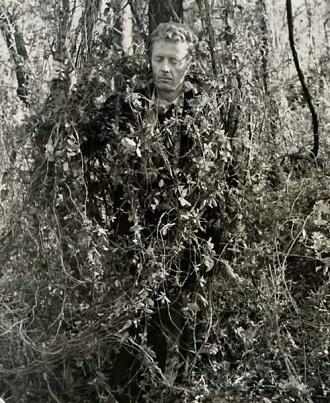
Paul Bowles
b. Dec. 30, 1910
image by Hans Richter
1950
_______________________
Image [&] Narrative
Vol 12, No 4 (2011)
Introduction to The Story of Things: reading narrative in the visual (part 2)
The Pre-Narrative Monstrosity of Images:
how images demand narrative
William Brown
Abstract
André Gaudreault (1990) has pointed out that early silent cinema screenings required a narrator in order to help audiences make sense of the images that they saw. Soon after, filmmakers began to adopt narrative techniques in order to tell stories – leading to the predominance of narrative within film production. Gaudreault has differentiated the presentation of images in early silent cinema from narration by calling it ‘monstration’. That is, simply ‘showing’ images. Jean-Luc Nancy (2003), meanwhile, has argued that all images are ‘monstrous’: that is, images are incomprehensible to spectators, in that they lie outside of meaning. Or rather, they do not lie outside of meaning so much as before meaning. Images are monstrous because upon initial viewing they do not make sense. In this way, images are pre-sense, they are present.In this article, Brown will combine Gaudreault and Nancy’s ideas through their shared use of the term for showing, monstration. Brown proposes that images do indeed pre-exist narrative, but that they simultaneously demand narrative in order for us to make sense of them. Given the monstrous nature of images, narrative in effect serves as a coping mechanism for consumers of images, who need various narrative techniques (film narrative, spoken words, text alongside the image, or even texts relating to the images that circulate more widely, as well as theoretical frameworks themselves) in order to make sense of images. Narrative always comes after images, and images therefore exist pre-narrative.
_______________________

The Real Unknown
Justin James Reed
photographs and an interview
The Great Leap Sideways
_______________________
“A Vision Outside the System”
A Conversation with Faith Nolan about Social Activism and Black Music in Contemporary Canada
Postcolonial Text
from Nicole Birch-Bayley's introduction
(....)
Paul Gilroy’s study of the transatlantic journey of black music across national and historical boundaries is salutary here. In his profoundly influential book, The Black Atlantic, he argues that the self-identity, political culture, and grounded aesthetics that distinguish black communities have often been constructed through music, which then becomes especially important in troubling the polar oppositions that structure colonialist logic. Nolan directly challenges the discord between individualist, nationalist and pluralist ideologies, seeking instead to reinvent the “ will” and “whim” of cultural aesthetics and symbols, as well as systems of language and political interactions. Black identity becomes not simply a social and political category to be used or abandoned in accordance with political rhetoric or agenda, but r ather the outcome of basic social function, or “practical activity,” including language, gesture, bodily significations, and desires. The musical performances of individuals such as Nolan become a kind of counter -ideology, an anti -war movement , as well as a physical demonstration of an ongoing journey of cultural reclamation and individual self -identification. Ultimately, as Gilroy suggests, the most important role of musical performance within black communities, as well as outside of them, lie s in its staging of an ongoing dialogue aimed at retrofitting traditional ideologies of race and gender.
The following interview reveals the extent to which Nolan is invested in opening up dialogues in the service of reinventing such ideologies. During our conversation, much of which charts the trajectory of her career, Nolan discusses the activist dimension of her music, touching on issues as wide -ranging as prison reform, the G20 protests, affirmative action, and the politics of academia. She also identifies several challenges that currently face activism in order to uncover the answers to certain pressing political questions that she has posed throughout her career. .....................................................
Faith Nolan
(....)
... even the truth about our own lives is scary. To admit, to say my mother was a prostitute, my father was a pimp, that is shameful... Because the standard is you have to be white, middle class, live like this, look like this, or at least try to. And if you don’t, do as much as you can: straighten your hair as much as you can, put skin lightener on, whatever you can do. And if you are white, make your hair blonde, because you are not white enough. And if your eyes are blue, make them more blue. Whatever we are is never good enough. (....)
It has to be manufactured, because once it is manufactured, it is controlled. I think a great [native writer], John Trudeau, writes about that sort of manufacturing, and in a deeper sense, Noam Chomsky, and I think he writes just about the authenticity of truth, and what that would really call for in all of us.
Postcolonial TextVol 6, No 3 (2011)
Open Humanities Press
_______________________

in heaven
Justin James Reed

Viewpoint II
1979
Helen Frankenthaler
1928 – 2011
_______________________
Night Thoughts of a Baffled Humanist
Marilynne Robinson
(....)Practically speaking, we can persuade ourselves of anything at all and act on it. This often manifests as a bold willingness to be rid of problem populations—intellectuals, for example, or Gypsies or Cherokees or Albigensians or Carthaginians, or sturdy beggars, or degenerates and social parasites. Anyone could add to this list the names of other groups and populations who have suffered clearances, pogroms and outright extirpations. The phenomenon recurs so often it should surely factor into any account we make of ourselves. Historical retrospect allows us to identify with past victims, with their humanity, with the fact that they were simply going about their lives and could not on any reasonable grounds be blamed for the real or imagined difficulties or the anticipated disasters that brought down real disaster on them. We can admire whatever traces remain of distinctive forms and motifs; we can retrieve the fragments of poetry and regret a loss whose dimensions such remnants can only suggest. Still, after so much history, those irritations at certain elements of society, certain problem populations, have never gone away, and are now clearly resurgent, becoming normalized and respectable, as they have done so often in the past.
(....)
What are we doing here? We may never know. If a solar storm should burn off the peculiar damp that clings to this planet, this would be a very small change—no change at all in cosmic terms, which apparently are based on averages. The universe is lifeless now and will be lifeless then, so negligible is our presence in it. What about us was of interest, if we imagine looking at ourselves in retrospect? That we made civilizations, or that we drove them to the ground, reduced them to rubble? I won’t pretend that this is a real question. We make wealth, and we destroy it. Our wealth is finally neither more nor less than human well-being. There is no necessary hypothesis; there is no value but what we value. The great temptation of money is that it seems to give us tokens, markers, by which things and people can be truly said to succeed or fail. The illusion that value inheres in it has vigorously survived a recent proof of its evanescence, in fact its utter dependency on our faith in its value. It has a placebo effect more predictably than it ought to, seeming to satisfy a need to know how value is discovered, or created, or conveyed, or preserved. It is human nature to want to know this. But, whatever else we might say about human nature, we can say it aligns most inexactly with the universe.
(....)
... we have entered a period of rationalist purgation. Rationalism and reason are antonyms: the first is fixed and incurious; the second, open and inductive. Rationalism is forever settling on one model of reality; reason tends toward an appraising interest in things as they come. Rationalism projects, and its projections typically fill it with alarm because of the inadequacy of its model, which, to the rationalist mind, appears as the perversity of the world. To this mind every problem is systemic, therefore vast and urgent. Rationalism is the omnium-gatherum of resentment and foreboding, the omnium-scatterum of everything of any kind that appears to stand in the way of a correction of reality back toward rational standards. Like paranoia, it all makes perfect sense, once its assumptions are granted. Again, like paranoia, it gathers evidence opportunistically, and is utterly persuaded by it, fueling its confidence to the point of sometimes messianic certainty. Ideology is rational, a pure product of the human mind....(more)
_______________________

Flirt
Helen Frankenthaler
2003
_______________________
Notable Death of the Year: RIP Austerity Economics, 1921-2011
Richard (RJ) Eskow
One of those deaths should have completely altered the political debate in Washington. The name of the deceased was "Austerity Economics," and it was first glimpsed in a 1921 paper by conservative economist Frank Wright. Austerity died of natural causes brought on by prolonged exposure to reality.
But the debate in Washington didn't change nearly enough after its passing. In the nation's capital, dead things still rule the night. _______________________
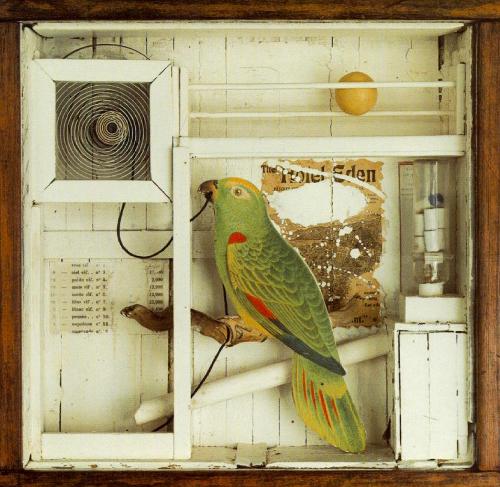
(The Hotel Eden)
c. 1945
Joseph Cornell
(December 24, 1903 – December 29, 1972)
_______________________
Chomsky, Noam. "Activism, Anarchism and Power."
Conversations with History (March 2002)
video
_______________________
Top 10 tools for Canadian activists
Activist Toolkit
rabble.ca
_______________________
The Digital Divide: Arguments for and Against Facebook, Google, Texting, and the Age of Social Networking
Mark Bauerlein (ed.)
(2011)
google books
pdf at Monoskop/log
_______________________
Occupy! An OWS-Inspired Gazette, No. 2 - 3 (2011)
_______________________

Helen Frankenthaler
1952
_______________________
Working Arrangement
Justin E. H. Smith
lapham's quarterly
(....)
To see gay marriage as a blow to the august institution of marriage, then, is to fail to take into account the fact that the institution as we know it is a very recent invention. Marriage was already blown apart, or at least completely broken off from its traditional role, with the rise of the nuclear family. In this respect, gay marriage is not a reduction to absurdity of an ancient institution, so much as it is an instance of late capitalism’s voracious absorption of everything that might otherwise stand as an obstacle to it. Just as society has learned to absorb countercultural signifiers into advertising for the junk that must be hocked in order for capitalism to survive, just as the big oil companies have cultivated the ingenious art of “greenwashing” and incorporated eco-babble into their own PR campaigns—so too has bourgeois marriage absorbed what was left of the sexual opposition....(more)

On the Needles of These Days
Jindrich Styrsky
Photographs, 1934–1935
Ubu Gallery Glimmers of irreality:
the photographs of Jindrich Styrsky
Alice Whittenburg
_______________________
Their Behavior
Dennis Vincent Brutus
(28 November 1924 - 26 December 2009)
Their guilt
is not so very different from ours:
— who has not joyed in the arbitrary exercise of
power
or grasped for himself what might have been
another’s
and who has not used superior force in the
moment when he could,
(and who of us has not been tempted to these
things?) —
so, in their guilt,
the bare ferocity of teeth,
chest-thumping challenge and defiance,
the deafening clamor of their prayers
to a deity made in the image of their prejudice
which drowns the voice of conscience,
is mirrored our predicament
but on a social, massive, organized scale
which magnifies enormously
as the private dehabille of love
becomes obscene in orgies.
Poetry & Protest: A Dennis Brutus Readergoogle books
_______________________
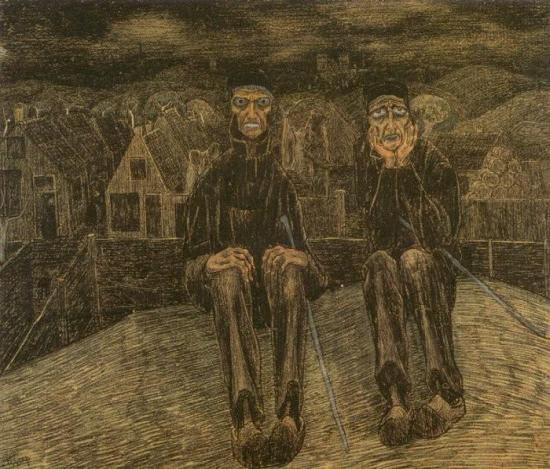
Les Calvinistes de Catwijck
Jan Toorop
1891
Also known as 'Hell and Doubt' or 'Old Superstitious Dreamers'.
_______________________
Movements against the enclosures: Virtual is preamble
Angela Mitropoulos
s0metim3s
Much is made of the difference between 'virtual' and 'actual'. Other than asserting a distinction between 'unreal' and the 'real', the uses of such oppositions demonstrates the real workings of a conflict between different approaches to and mappings of space, as both cyberspace and landscape. The singular experience of the net consists in making manifest a particular sense and use of space-including the socalled 'real' space of the world's surface-that has no place in officially-sanctioned, or rather petrified, maps and models. Because more than the question of whether the content of various sites or techniques remain trapped in the figurations bequeathed to us by the French Revolution (where 'man' exists as human, and has human rights, insofar as 'he' is a citizen of a nationstate), the experience of the net is otherwise. Moreover, I want to insist, above all, that what is virtual is preamble, that it exists. The virtual spaces of cyberspace have a distinctive connection to that which is immanent and imminent, material and emergent, or better: the net is really, virtually that which makes apparent, and increasingly convenes, an antagonism to authorised spatial organisation. geopolitics
_______________________
Tyro 1 [pdf]
edited by Wyndham Lewis
Song to the Opherian
Gus Krutzsch
aka T.S. Eliot
The golden foot I may not kiss or clutch
Glowed in the shadow of the bed
Perhaps it does not come to very much
This thought this ghost this pendulum in the head
Swinging from life to death
Bleeding between two lives
Waiting that touch.
The wind sprang up and broke the bells,
Is it a dream or something else
When the surface of the blackened river
Is a lace that sweats with tears ?
I saw across the alien river
The campfire shake the spears.
at The Center for Digital Initiatives you can also find pdfs of
Tyro 2, BLAST 1 and
BLAST 2 (War Number)
_______________________

Jindrich Styrsky
_______________________
The Anarchist Turn Symposium 2011
Ten Years After 9/11: An Anarchist Evaluation
Anarchist Developments in Cultural Studies No 1 (2011)
_______________________
_______________________
The Crisis of Negation: An Interview with Alain Badiou
John Van Houdt
continent. 1.4 (2011)
_______________________
From Christ to the Bourgeoisie [pdf]
Gilles Deleuze
Translation: Raymond van de Wiel
_______________________

Jindrich Styrsky
(1899-1942)
_______________________
Special Issue on Women and Surrealism
Journal Of Surrealism And The Americas
Issue 5:1-2 (2011)
_______________________
Index of everything published in Jacket2
_______________________
The New Media: Between Revolution And Repression – Net Solidarity Takes On Censorship
Reporters Without Borders
_______________________
Defending Privacy at the U.S. Border: A Guide for Travelers Carrying Digital Devices
The Electronic Frontier Foundation
_______________________
Teaching Copyright
A project of the Electronic Frontier Foundation
_______________________
Ten Small Green Groups That Make a Big Difference
Jeffrey St. Clair
_______________________
The Complete Works of JG Ballard (.mobi)
available at seedy

photo - mw
_______________________
`With Nothing But New Words'
Patrick Kurp
Anecdotal Evidence
(....)
For Guy Davenport in “The Man Without Contemporaries” (The Geography of the Imagination, 1981), it also comes down to words, the next word:
“Mandelstam wrote anywhere and everywhere. We can scarcely begin to realize his world in which the pencil stub and the three pieces of paper you have is all the pencil and all the paper you are ever going to have.”
...(more)
_______________________
Children dressed as animals dressed as children
(or, The Meaning of Christmas)
Natalia Cecire
... As early as 1993, Eve Sedgwick had already sketched out some of the consequences for queer theory of the ideology surrounding American Christmas, in which religion, capital, state, and "family" merge in a unison chorus of "'tis the season."
What’s “queer?” Here’s one train of thought about it. The depressing thing about the Christmas season—isn’t it?—is that it’s the time when all the institutions are speaking with one voice. The Church says what the Church says. But the State says the same thing: maybe not (in some ways it hardly matters) in the language of theology, but in the language the State talks: legal holidays, long school hiatus, special postage stamps, and all. And the language of commerce more than chimes in, as consumer purchasing is organized ever more narrowly around the final weeks of the calendar year, the Dow Jones aquiver over Americans’ “holiday mood.” The media, in turn, fall in triumphally behind the Christmas phalanx: ad-swollen magazines have oozing turkeys on the cover, while for the news industry every question turns into the Christmas question—Will hostages be free for Christmas? What did that flash flood or mass murder (umpty-ump people killed and maimed) do to those families’ Christmas? And meanwhile, the pairing “families/Christmas” becomes increasingly tautological, as families more and more constitute themselves according to the schedule, and in the endlessly iterated image, of the holiday itself constituted in the image of ‘the’ family.
The thing hasn’t, finally, so much to do with propaganda for Christianity as with propaganda for Christmas itself. They all—religion, state, capital, ideology, domesticity, the discourses of power and legitimacy—line up with each other so neatly once a year, and the monolith so created is a thing one can come to view with unhappy eyes. What if instead there were a practice of valuing the ways in which meanings and institutions can be at loose ends with each other? What if the richest junctures weren’t the ones where everything means the same thing?
Christmas is about capitalism—of course; everyone knows that, albeit usually in the context of bemoaning it. Sedgwick's insight is that Christmas's univocality allows each of these sites of power—capital, the state, "the" (heteronormative, reproductive) family, religion—to stand in as a metonym for all the rest. You buy Christmas presents because you love your family because the Christ-child loves you because you love the Child because the Child is the future of the nation, and round and round. Christmas has meaning, we are continually assured, and it is all the same meaning—the single, univocal meaning that the unmeaning sinthome both opposes and makes possible. If Christmas is about "meaning," then a purely negative Scrooge is the reason for the season....(more)
via Adam Kotsko
_______________________

The Gospel Of Supply Side Jesus
Al Franken
youtube
_______________________
Uses of a Whirlwind
Movement, Movements, and Contempporary Radical Currents in the United States
Team Colors Collective
ifile pdf
From housing struggles to food politics, from poor people's movements to radical art projects, from the Right to the City Alliance to the US Social Forum, Uses of a Whirlwind explores the current composition of social movements in the United States. With equal emphasis placed on movement history and movement building, Whirlwind is a call to action for a new decade of organizing. Contributors include Robin DG Kelley, Grace Lee Boggs, Michael Hardt, Chris Carlsson, Take Back the Land, Domestic Workers United, the Starbucks Workers Union, Brian Tokar, Dorothy Kidd, and Ashanti Alston.
Team Colors is a geographically dispersed militant research collective.
Team Colors is a collective engaged in 'militant research' to provide 'strategic analysis for intervention into everyday life'.
_______________________

Art Sinsabaugh
(1924-1983) via Gary Sauer-Thompson
“Life on the road: Art Sinsabaugh’s Midwest Landscapes”
Stephen Longmire
If Edward Hopper had been a photographer, he might have been Art Sinsabaugh. Both are poets of the ordinary, of the inhabited but often unpeopled landscape, sociologists of the visual with a magical realist touch. And both take as opportunities for their pictures the way the world opens itself up to the blind, perpetual gaze of the road....(more)
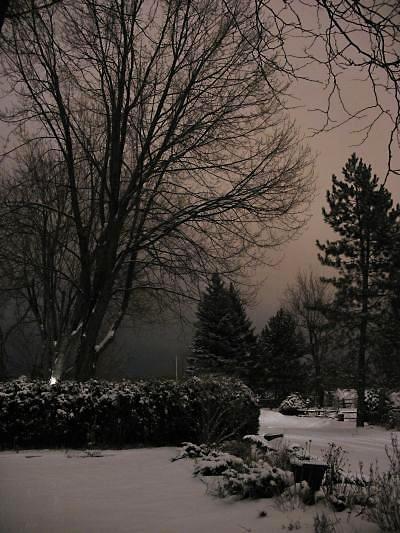
photo - mw
_______________________
Clarity
Edgar Bayley
Translated from the Spanish by Emily Toder
Clarity has always tempted me
And clarity has at times denied me
Like a bird that flies in dreams
And falls and keeps falling without flying like dead weight
Clarity has always tempted me
Especially the clarity of elder leaves
Also the clarity of the pebble
And of fir branches
And the fast and fierce clarity of the salamander
(....)
And as clarity has always tempted me
That time when under an open and spread out sun
The waters of the bay began to grow choppy
Until acquiring a purplish tint
And a large white bird suddenly emerged from between the clouds
Beating its wings and fluttering smoothly around
I decided that it was the moment to toss these words to the sea
Because the clarity that I sought so much
Is only in certain silences
In certain blank spaces
Before and after few and trivial words
...(more) Gulf Coast
Winter/Spring 2012
_______________________
Spurious on Blanchot
(....)
Blanchot's concern with language as the 'outside' remembers an experience of language over which the 'I' has no power. Sometimes, Blanchot presents it as a kind of silence, but this should not be understood too quickly: gaps in language are readily assimilable by the common order of sense. Silence stands in for an interruption of language as it is experience in the absence of the form of the subject. This may seem absurd, since the position of the 'I', the subject, is presupposed in all speech and writing. But the Blanchotian subject is unstable; it does not come to itself once and for all, but can break down, its power scattering like sand, like J.'s pulse in Death Sentence. And so with the experience of the outside, where what is reached is the hither side of language, language unsubordinated to the intentions of anyone.
This is not mysticism. The experience of language as the outside is perfectly ordinary, says Blanchot; it is the way we live the everyday and the idle chatter that fill it. ...(more)
Draft for an essay on Blanchot's plans for a lit reviewSpurious
Draft for an essay on Blanchot's notion of the récitSpurious _______________________
Spinoza of Wall Street
Ezra Glinter reviews Bento's Sketchbook by John Berger
(....)
In his latest book, “Bento’s Sketchbook,” he reflects: “What one is warning and protesting against continues unchecked and remorselessly. Continues irresistibly. Continues as if in a permissive unbroken silence. Continues as if nobody had written a single word. So one asks oneself: Do words count?”
In “Bento’s Sketchbook” Berger turns to an unexpected source for insight: the 17th-century philosopher Baruch, or Benedict, or “Bento,” Spinoza. The premise of the book is based on a sketchbook Spinoza is supposed to have kept, but which was lost or destroyed. Berger, who is an artist as well as an art critic, sets out to reimagine the lost works....(more)
_______________________
Acts of Resistance: Against the New Myths of Our Time
Pierre Bourdieu
Translated by Richard Nice
1998
iflile pdf
To the Reader
The texts that follow were written or spoken as contributions to movements and moments of resistance, and it is because I believe that the dangers that provoked them are neither isolated nor occasional that I decided to bring them together for publication. Although they are more exposed than methodi-cally controlled texts to the inconsistencies stemming from the diversity of circumstances, I hope that they can still provide useful weapons to all those who are striving to resist the scourge of neo-liberalism.
I do not have much inclination for prophetic interventions and I have always been wary of occasions in which the situation or a sense of solidarity could lead me to overstep the limits of my competence. So I would not have engaged in public position-taking if I had not, each time, had the - perhaps illusory - sense of being forced into it by a kind of legitimate rage, sometimes close to something like a sense of duty. The ideal of the collective intellectual, to which I have tried to conform whenever I could make common cause with others on some particular point, is not always easy to put into effect.
And if, to be effective, I have sometimes had to commit myself in my own person and my own name, I have always done it in the hope - if not of triggering a mobilization, or even one of those debates without object or subject which arise periodically in the world of the media - at least of breaking the appearance of unanimity which is the greater part of the symbolic force of the dominant discourse. _______________________
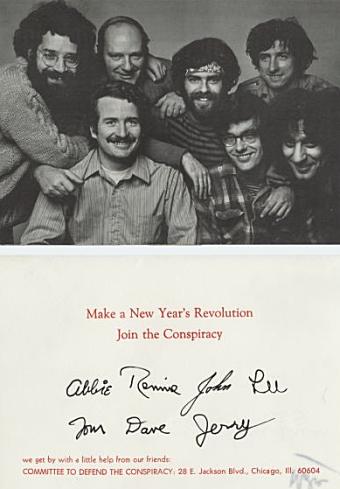
Holiday card
Committee to Defend the Conspiracy
1968
American History Through Christmas Cards
Wisconsin Historical Societyvia gmtPlus9 (-15)

Ticker Tape Celebration
1969
_______________________
The Top 10 Films that Explain Why Occupy Wall St. Exists
Films For Action
_______________________
Griftopia: A Story of Bankers, Politicians, and the Most Audacious Power Grab in American History
Matt Taibbi
google books
pdf available at Monoskop/log
_______________________

photo - mw
_______________________
The Memory of Agoraphobia
Dylan Trigg
Side Effects
(....)
Your disease was not only activated by space alone. For twenty-seven years, you could not voice certain words without reliving the meaning of those sentences in your body. Very frequently, you were reduced to a mute state. You remember a hallway and a conversation. Somewhere, the word "collapse" was mentioned, and you swiftly proceeded to fall to the floor in a state of slumbering stupefaction. Everywhere, people looked down at your lumbering body, possessed by the magic of inertia. Your body had given way, and since then you have exercised special caution about saying and hearing certain words. Words such as "frailty," "blood," and "flesh" are extremely hazardous to you, and you will think very carefully about your surroundings before you mention them.
Today, you must exert considerable effort to remember such episodes. They are buried in time, now assuming a photographic stillness devoid of their terror. But the experiences have not left your body. When crossing the street, you still feel that latent hesitation that comes with the phobic worldview. Beneath the electric lights of the world, you sense the vibrations that are otherwise invisible. Touched by the madness of phobia, you are unable to re-enter the world of things....(more)
_______________________
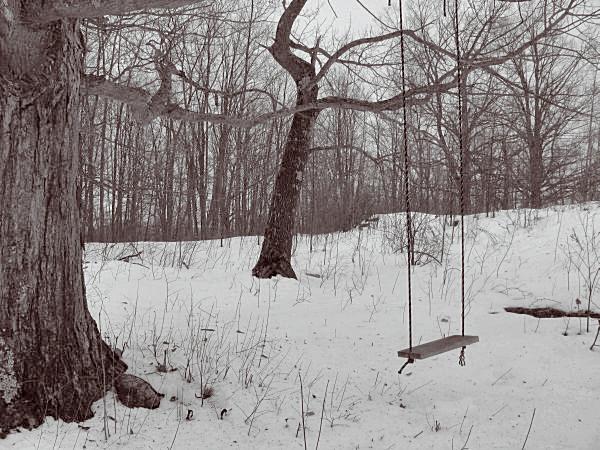
photo - mw
_______________________
Notes Toward a Supreme Fiction
Wallace Stevens
(....)
VII
He imposes orders as he thinks of them,
As the fox and snake do.It is a brave affair.
Next he builds capitols and in their corridors,
Whiter than wax, sonorous, fame as it is,
He establishes statues of reasonable men,
Who surpassed the most literate owl, the most erudite
Of elephants.But to impose is not
To discover. To discover an order as of
A season, to discover summer and know it,
To discover winter and know it well, to find
Not to impose, not to have reasoned at all,
Out of nothing to have come on major weather,
It is possible, possible, possible.It must
Be possible.It must be that in time
The real will from its crude compoundings come,
Seeming at first, a beast disgorged, unlike,
Warmed by a desperate milk.To find the real,
To be stripped of every fiction except one,
The fiction of an absolute— Angel,
Be silent in your luminous cloud and hear
The luminous melody of proper sound.
VIII
What am I to believe?If the angel in his cloud,
Serenely gazing at the violent abyss,
Plucks on his strings to pluck abysmal glory,
Leaps downward through evening’s revelations, and
On his spredden wings, needs nothing but deep space,
Forgets the gold centre, the golden destiny,
Grows warm in the motionless motion of his flight,
Am I that imagine this angel less-satisfied?
Are the wings his, the lapis-haunted air?
Is it he or is it I that experience this?
Is it I then that keep saying there is an hour
Filled with expressible bliss, in which I have
No need, am happy, forget need’s golden hand,
Am satisfied without solacing majesty,
And if there is an hour there is a day,
There is a month, a year, there is a time
In which majesty is a mirror of the self:
I have not but I am and as I am, I am.
These external regions, what do we fill them with
Except reflections, the escapades of death,
Cinderella fulfilling herself beneath the roof?
...(more)

photo - mw
_______________________
North of Everywhere
Helen Mort
Blackbox Manifold
i. Hermaness
Last night, my body was a compass needle
drawing me past every place I’d once called North:
past Sheffield’s border lands, the sleeping giant
of Manchester, grey towns en route to Aberdeen
then silently across the waterway to Lerwick
where my bearings ferried me past Baltasound,
the sloughed down moors, past Norwick bay
where waves worry at rock all day.
By nightfall, I’d approached the edge of Unst,
the land curtseying to meet the sea,
a lighthouse with no keeper but a resting gull,
the tide, dragged from a North
I couldn’t even dream. I stopped
and let my heart go on ahead of me.
...(more)
_______________________

Jan Toorop
b. Dec. 20, 1858
_______________________
Grasmere Oak
Helen Mort
Since there’s no blind, the tree outside’s
a curtain on your room, the yolk-bright mornings
breaking through. Last night, its shadow seemed
the only thing between you and the leaking dark,
the rain set loose and needling the bark.
Look close. Its leaves direct the wind.
Your world’s veiled by a moving thatch —
this is the way a hunter squints through grass,
a hide-and-seek cheat peers over their hands,
a girl looks up from underneath her fringe.
This is the landscape’s hidden hinge
where all things start and peter out:
the summers you were blind to, winters when
the tree gave back the tin-roof coloured sky,
the small, white knuckle of a distant farm.
These branches force the valley’s arm,
pin down the light, headlock the air
until there’s nothing left of it at all.
Watch how the leaves balance the sky,
then let it fall.
in pamphlet collection, Lie of the Land, 2010
The Wordsworth Trust
Helen Mort at Poetry International Web
_______________________
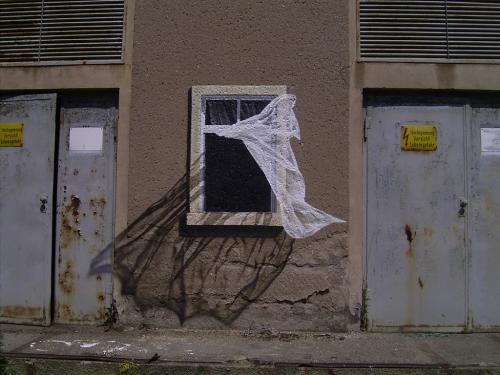
106 Street Art Photos
Year 2011
Street Art Utopia
_______________________
Combo: A Journal of Poetry and Poetics, 1998-2003
(ed. Michael Magee)
jacket2 reissue
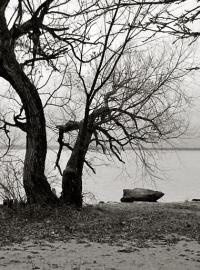
photo - mw
_______________________
from Postkarten, 1972-77
Edoardo Sanguineti
(1930-2010)
translated by Will Schutt
drunken boat
49. [TO PREPARE A POEM]
to prepare a poem take “a small true fact” (fresh-baked
if possible): there’s a similar recipe in Stendhal, I know, but in the end
it yields a much different taste: (and I’d lose at least an hour now,
here, looking up an apt quote: and frankly I don’t want to):
it helps to clear up
time and space: a specific date, a scrupulously defined place, these are the most
desirable ingredients, in any event: (ditto characters, who should be drawn according
to their vital stats: and identifiable via objective recognizable traits):
I said Stendhal:
but, for style, there’s no need for civic codes today (and therefore no Napoleon,
naturally): (think of Gramsci, instead, in the Notebooks or Letters, yet
seasoned with a little spice: the kind you might find back there in the kitchen
next to young Marx): and voila! we have a tasty, edible dish, a verifiable specialty:
(verifiable in the sense the word takes on in Brecht, I think, in some
notes from the Arbeitsjournal): (as for the V effect, which you’ll need, that can be
whipped up by modest means): (as, for example, with a dash of Artusi and Carnacina):
in conclusion, poetry consists, all told, of this type of work: wedging the words
into quotes or italics: trying to make them memorable, like a lot of quick-witted
jokes: (that imprint themselves on the mind, with a side of socially acceptable
devices): like the alliterations above and, let’s suppose, the usual metaphors):
which come to signify, then, on the whole:
careful, o reader, and commit me to memory):
...(more)
Drunken Boat 14
_______________________

Kodak factory at Harrow
1890s'
Kodak’s Harrow factory was in use from 1891 for emulsion-making, paper-coating and for the processing and printing of customers’ films. In this view, taken soon after its opening, female employees are seen printing negatives by sunlight in the upper gallery of Building 1.
The egg-white needed to coat albumen paper for contact printing was supplied by a flock of a hundred chickens kept on the site.
- the British Library
_______________________
Four poems from Das Auge des Entdeckers (The Discoverer's Eye)
Nicolas Born
Translated by Eric Torgersen
exquisite corpse
On the Inside of Poems
You can't make a living
competing with reality
you can't live on reality either
you can survive an operation
and get everything back
and go on through Life
through quickly fading pictures
that was you
you and the One in the Oven
Persons panting under their tombstones--
With unspeakable exertion
by you and all your ancestors
you shield yourself
Land and water remain
the sky remains
and you remain
you have nothing to get ready for
little suns light your democracy And
you choose life and death
you have many Beautiful Voices
you are many
your skin is your skin And finally
nothing but skin
you're the entrepreneur of Life
impresario of white apparitions
you're the Spaceman out in the universe
the author of the course of history
...(more)
_______________________
The Weather: A Report on Sincerity
Lisa Robertson
(....)
Here is want I want to say. Sincerity has a rhetorical history. The history of the description of weather parallels the history of sincerity as a rhetorical value. The delimitation or purification of diction is common to both. Part of this delimitation is idiomatic; part derives from a tradition of quotation, of genre. When Virgil described the weather prognosticatons in The Georgics, he quoted Lucretius and Aratus' Diosemia, which in turn referred to Hesiod's Works and Days. James Thomson, in The Seasons, quoted Virgil, both structurally and substantially. John Clare learned an ideology of directly observed description from Thomson, as did Wordworth. Etcetera. But parallel to the literary and idiomatic geneology of the atmosphere, was the standardization of scientific rhetoric, the language of natural philosophy and early meteorology.
(....)
What these natural histories of the sky share, in spite of stylistic modifications and developements in the rhetoric of descriptive sincerity-- and the dogmas and transgressions of that rhetoric--, is a participation in a broad cultural project, the enlightement project, to collectively describe and test the parametres of Truth. Even in the early Wordsworth, the methodological project, the experiments in diction and address, the romance of the perceiving subject, are aligned with a sceptical conservatism concerned with the description and promotion of static, enduring values. We see, in the history of clouds, the shift from description as ontological figuration, to description as notation of situational modification and change-- the delimitation or formalization of cloud nomenclature permitted perception to begin to annotate patterns of temporality, rather than properties of objects. Clouds, in a sense were invented at the point when sincerity ceased being a rhetoric, as in Sprat, and submerged itself in the cultural ontology of Romanticism.
Yet in the small, named, quantified world of the description, temporal improprieties can be observed. Like a little weather demonstrating formal inexhaustibility, the empirical description is the site of its own transgression. So it is sincere, and it is a model of uninterpretability.
What I want to do is to infiltrate sincerity-- not to dissolve it in sceptical critique, but to lift it from its maudlin imprisonment, return to it the rhetorical play of idiom, of scale, enjoy its identificatory intensities and climates as conditions or modifications that pass over the face. I am a spy....(more)
12 or 20 questions with Lisa Robertson
rob mclennan
Lisa Robertson at Coach House Books
_______________________
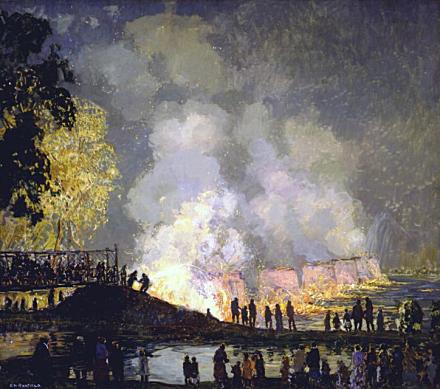
The Burning of Center Bridge
1928
Edward Redfield
b. Dec. 18, 1869
_______________________
Logos
2011: vol. 10, issue 4
Reflections on the Occupy Wall Street Movement
With essays by:
Stanley Aronowitz, Benjamin Barber, Stephen Eric Bronner
Steve Early, Bill Fletcher, Kurt Jacobsen, Jeff Madrick
Ian Williams, Rick Wolff, Richard Wolin and Gregory Zucker
Bringing Authoritarianism Back In: Reification, Latent Prejudice, and Economic Threat
Alex Stoner and Eric Lybeck
_______________________
Three Months of Occupy: A Movement in Photos
in these times
_______________________
6 Stories That You May Have Missed From the Occupy Movement
_______________________
The End of the Beginning
Ben Ehrenreich
la review
Someday soon, I suspect, we will thank the mayors and their cops for the gift of their shortsightedness, for pushing the movement out of the parks and forcing it into a fruitful and vibrant nomadism. Onward: to the universities, the ports, the banks, as far as our legs and our imaginations take us.
_______________________
To Have Is to Owe
Mesopotamian usury, Vedic accounting, American Jubilee: excavating the history of fiscal debt.
David Graeber
triple canopy
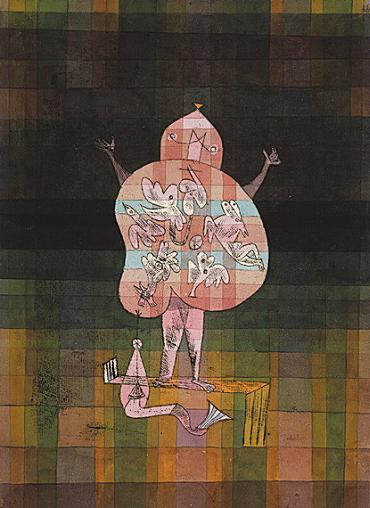
Ventriloquist and Crier in the Moor
1923
Paul Klee
b. Dec. 18, 1879
_______________________
Common Areas
George Stanley
The common areas are where we meet
but don’t meet.
Somewhere I read, or was told,
I should smile.
An error here
might reflect on my right to be here.
*
We meet here, on our way
from the inside to the outside
the outside to the inside,
in this place that is neither in nor out,
this common place given for us to use,
coming in or going out.
When my fellow tenant and I are both going out,
we are each going into the world,
into our secret lives.
...(more)
19 questions with George Stanleyrob mclennan dooneys cafe
Vancouver: A Poem
George Stanley's remarkable, conflicted ode to his 'city of death, city of friends'.
Stan Persky
_______________________
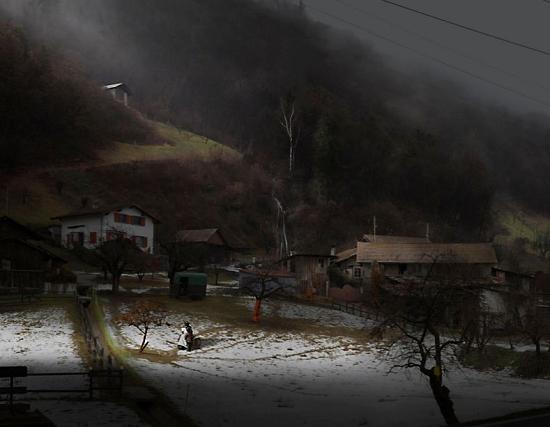
My sentimental archives
Nicolas Dhervillers
via Hippolyte Bayard
_______________________
staring at a wall...
Witold Riedel
the shadows on the wall just appeared and then disappeared again. the wall is now more about the cracks and the uneven spots. it is not a screen for thin stripes of shadow and light.
i would like to write something about the architecture of the chinese house. but all that comes to mind are my limitations in understanding. it might also take a bit more time for me to really understand things. it is dangerous to write without understanding?
but perhaps language itself is so imprecise that even the most understanding writer can easily be misunderstood. or misinterpreted.
language is alive. and language is ever evolving. words that sound harmless today, could be potentially deadly tomorrow. words that look friendly today, could potentially be dirty little animals tomorrow... and words that seem harmless to me, could appear without intelligence to those looking for my weaknesses.
and we should probably not fool ourselves that solid objects do not change with us and our intentions and understanding. even objects and houses and cities and countries are in some way connected to the way we want to see them. and the way we see things changes. it should change, i hope, it should probably change all the time?
some of the changes are very subtle. and sometimes the changes are massive.
it will take a really long time for me to understand the chinese house. it will take a long time to understand not the theory of it, but the reality, the true emotional meaning of it. and by the time i will understand it, it will probably be late in my life. i will finally know what it means, but that meaning will probably be a story i will watch disappear?
i do not know, i do not know....(more)
_______________________
'Why are you weeping?' said Bembel Rudzuk.
'I am suffering from an attack of history,' I said.
'It will pass,' said Bembel Rudzuk.
-
Pilgermann
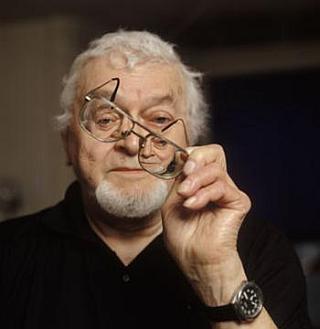
Russell Hoban
1925 - 2011
photo by by John Carey
More and more I find that life is a series of disappearances followed usually but not always by reappearances; you disappear from your morning self and reappear as your afternoon self; you disappear from feeling good and reappear feeling bad. And people, even face to face and clasped in each other's arms, disappear from each other.
- Fremder
_______________________
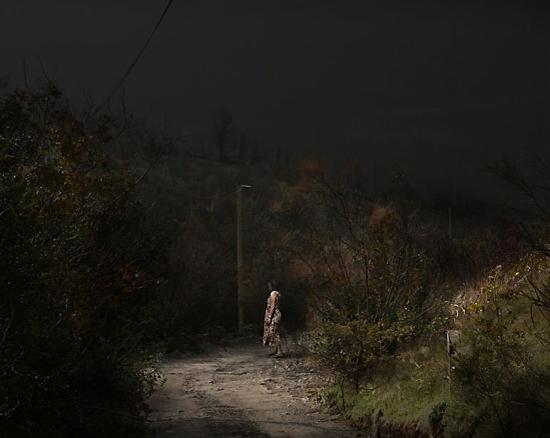
tourists
Nicolas Dhervillers
_______________________
M/E/A/N/I/N/G Online #5
25th Anniversary Edition (2011)
Introduction
Susan Bee and Mira Schor
We began planning this issue in the way we had planned other forums in the past: we discussed and tried to formulate our specific personal concerns and our sense of general contemporary concerns into questions and themes that we would invite a spectrum of artists to respond to. Our mutual and separate lines of thought and feeling merged into two themes:
Theme 1
How do public traumas like 9/11, the wars in Iraq and Afghanistan, the rise in income inequality in the U.S., and the current recession affect, or frame, the production of your art works and art criticism? What is the role of individual style or idiosyncrasy in these times and circumstances? What is the role of the art market/fashion/art history versus such public or individual/idiosyncratic motivations and frames?
Theme 2
How do artistic intuition, creativity, community, production, and distribution function for you in the age of digital corporate conglomerates and the web 2.0? What is the nature of privacy for the artist or critic working in the age of social networking and global spectacle?
We were surprised and delighted by the enthusiastic response to our initial invitation sent out in mid-August to a wide spectrum of artists, critics, historians, theorists, and poets, some who had written for our journal before and many new artists and writers whose work we have encountered in recent years.
_______________________
Social Text
Issue 108: Fall 2011
Legal, Tender [pdf]
The Genealogical Economy of Pride, Debt, and Origin
Angela Mitropoulos
Abstract: This essay queers the critique of political economy through the analytical category of the household, focusing on the centrality of genealogical orders to the persistence of capitalism over time and in frontier spaces. In so doing, it makes an argument against a politics of recognition and rights, situating them as a matter of both the expansive embrace of capitalism and its periodic restoration of limits along genealogical lines.
_______________________

photo - mw
_______________________
PennSound Radio
24/7
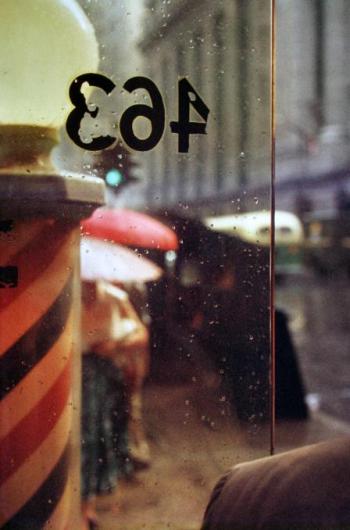
Saul Leiter
.....................................................
Saul Leiter and the Typographic Fragment
Rick Poynor
Design Observer
While Leiter's pictures are accidents of happenstance, transitory moments of sensation and impression that he was able to anticipate, track and capture, every element held within the frame reads with the same deliberation as a carefully pondered brush stroke or a purposefully applied wash of color. Leiter knew exactly what he was doing with these stray letters and word fragments.
_______________________
The Thing We Mean is Love
Oana Sanziana Marian on David Bellos's Is That a Fish in Your Ear?: Translation and the Meaning of Everything
words without borders
... Bellos’s book deconstructs the implications of language tools one takes for granted, from dictionaries to automated language translation programs such as Google Translate, suggesting we are all translators every time we pick up a thesaurus, or that the reason automated translation programs work is that we mostly use language to say the same things over and over again. And judging by the blithely unpretentious tone of Is That a Fish in Your Ear?—the title of the book comes from The Hitchhiker’s Guide to the Galaxy, which mentions a universal translating tool in the shape of a “small, yellow, leech-like” fish one sticks in the ear—and his preoccupations with Perec and Tati, masters of visual and linguistic play, discovery and delight clearly play vital roles in Bellos’s intellectual investigations. One could think of David Bellos as the Richard Feynman of translation, in that he approaches his subject with a lively acumen that fundamentally transforms the reader’s understanding of it. Each of their work imagines the possibility of a general interest in translation and physics, respectively....(more)
_______________________
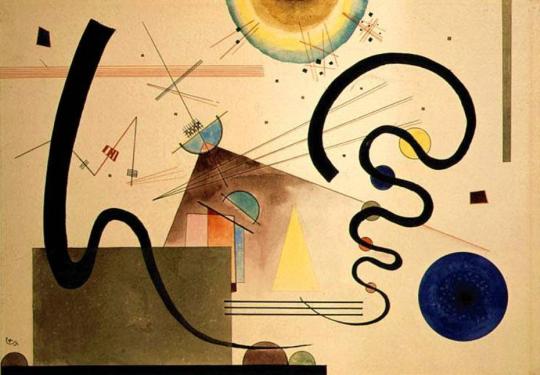
Wassily Kandinsky
b. Dec. 16, 1866
_______________________
Beyond the Body Proper: reading the anthropology of material life
edited by Judith Farquhar and Margaret Lock
google books
pdf available at Monoskop/log
from the introduction by Judith Farquhar and Margaret Lock
...There has been a proliferation of fascinating empirical studies
multiplying the kinds of bodies that can be perceived and widening the scholarly
vision of human capacities.
This emergence of the lived body was not entirely unprecedented. Phenomenological
philosophy had long explored problems of embodiment—a term
that emphasizes process and contingency—and offered a dynamic understanding
of human being as inseparable from a universal human physicality existing
within complex fields of influence. The related philosophical traditions of
vitalism and pragmatism also sought to understand material life beyond the
dualities of mind and body, and some of the key works in these orientations are
now being productively reread. These intellectual movements resisted modernist
tendencies to excise subjectivity and experience from material bodies
and worlds, idealizing them for the disciplinary attention of humanists and
social scientists.
Even so, most of social science continued for a long time to treat bodies as
the naturalized, essentially passive atoms or building blocks of society. The
body offered to social thought by nineteenth- and twentieth-century biomedical
specialties, though a complex materiality in its own right, was easily appropriated
in social thought as a capsule of nature that could be inhabited, but not
altered, by culture (see part I). The classic problematic of the relations between
individual and society that still provides analytic tools for most of the social
sciences seems to require a "proper" body as the unit of individuality. This
body proper, the unit that supports the individual from which societies are
apparently assembled, has been treated as a skin-bounded, rights-bearing,
communicating, experience-collecting, biomechanical entity. Our common
sense has attributed basic needs to this discrete body along with fixed gender
characteristics. In law it has been seen as the only possible basis for the citizen s
responsibility to act and to choose. In the humanities it was long treated as the
locus of an originary consciousness that is expressed in voice, image, and
action. However contradictory this complex hybrid body may seem, its naturalness
and normality tend to be reinforced by the operations of common
knowledge and standard operating procedure in many contemporary spheres
of activity.
Recent scholarship in the human sciences, led perhaps by gender, ethnic,
and rights activism in postmodern popular culture, has turned away from the
commonsense body, however, learning to perceive more dynamic, intersubjective,
and plural human experiences of carnality that can no longer be referenced
by the singular term the body.
_______________________
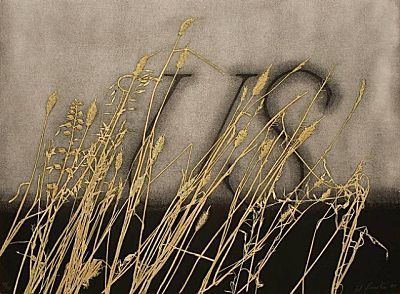
Ed Ruscha
b. Dec. 16, 1937
_______________________
Debt by David Graeber
Justin E. H. Smith
bookforum
(....)
The guiding principle of Graeber's sweeping global history is that debt must not remain the exclusive property of economic historians, and moreover, that anthropologists are better equipped to take on the issue. The foundational myth on which economics rests, and which Graeber relishes debunking, is the "touchingly utopian" idea that money emerged directly out of primitive barter systems and had only to do with interest-maximizing exchange. Arguing against this from an anthropological perspective, Graeber claims that debt is the basis of society, and as such is inherently ineliminable. He illustrates this point through the example of debt to one's parents: to seek to cancel that debt would be impossible. Graeber describes a system of gift-giving in traditional societies that takes place over time, and involves gifts of slightly more or less value than the ones that preceded them, thus ensuring that everyone is always slightly in debt or in credit to everyone else. This sort of debt, he says, is nothing less than the continual creation of society. It is not so much that we owe something to society, but that society "just is our debts."
This good, society-constituting debt, as opposed to the society-destroying kind the Occupiers are speaking out against, is sustained by what Graeber calls "human economies," where money "acts primarily as a social currency, to create, maintain, or sever relations between people rather than to purchase things." Graeber makes no secret of his affection for these sorts of economies, nor of his skepticism for what came after it: religion, morality, politics, and the criminal-justice system, all of which might be seen "as so many different fraudulent ways to presume to calculate what cannot be calculated, to claim the authority to tell us how some aspect of that unlimited debt ought to be repaid." Curiously, then, the bad debt seems to emerge only when it is conceived of as something that can be paid in full. If it can be paid, then the claim that debt exists in the first place is a fraudulent one—as when the IMF demands repayment from impoverished Third World countries—and should accordingly be cancelled. By contrast, real human debts, should never be paid or cancelled....(more)
_______________________
Merit and dreams
Roger Gathman
(....)
In a formal sense, waking is a break with dreaming, but it is so only to the extent that consciousness succeeds in substituting its strong sense of externality for the insulation of dreams. In fact, of course, we carry that insulation about with us in our ordinary life, a depthless pocket that we become uneasily aware of when we drop something in it – the typo, the address we forgot, bad luck and fuckups, a whole day’s worth of silent muttering and inattentions.
It is against this psychological and existential background that one should examine the last instantiation of the Enlightenment utopia, meritocracy. The version current in America is tht disparities of wealth and income should correspond to disparities in merit. Some students did the homework and got As, some didn’t and got Fs.
This, it should be said, is a curiously childish way of seeing the world, and could only have been developed in that Asperger’s paradise of a discipline, economics. To return to Plato again, what this idea does is shift the focus entirely from the thing done to the external reward for doing it. In so doing, the thing done is curiously emptied of all merit on its own, all glory. The perfect meritocracy would be one in which the thing done requires a highly developed amount of skill, and is absolutely pointless. Thus, it should be correspondingly awarded with showers of external reward. This is an exact representation of the current financial services sector, at least in its higher reaches....(more)
_______________________
 mid-December rain
Ottawa river at Arnprior
photo - mw
A Translation of "Goethe schtirbt" by Thomas Bernhard
Douglas Robertson
On the morning of the twenty-second Riemer urged me to speak during my one thirty-scheduled visit to Goethe on the one hand softly, on the other hand not so softly to the man of whom it was only now being said that he was the greatest luminary of his nation and at the same time the supremely greatest of all Germans up until the present, for he now hears on the one hand at one moment with downright appalling clarity, at another pretty much no longer at all, and one does not know what he hears and what he does not hear and although it is the most difficult thing while interviewing the genius, who is lying there more or less motionless the whole time, on his deathbed, which faces the window, to arrive at a suitable volume in one’s own utterance, it should nonetheless be possible, especially by way of a supreme sensory attentiveness, to discover in the course of this now merely melancholy-inducing interview precisely those means [of communication] that accord with his now universally evidently terminal mind. ...(more)
_______________________
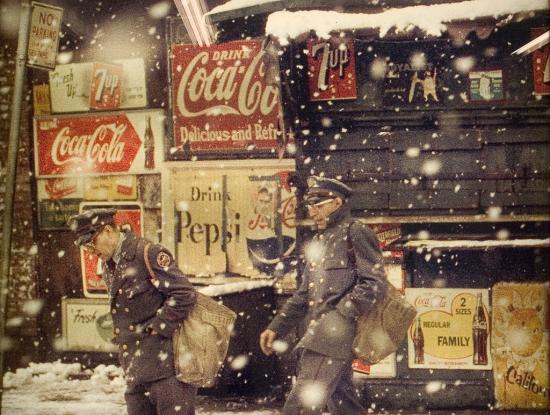
Saul Leiter
1 2 3 4
_______________________
Inventory
by Richard Hoffman
What I have given to sorrow,
though I have poured out
all I am again and again,
does not amount to much.
One winter’s snows.
Two loves I could not welcome.
A year of mostly silence.
Another man I might have been.
one of two poems at agni
Richard Hoffman has posted links to some of the poems included in his new collection, EMBLEM
|

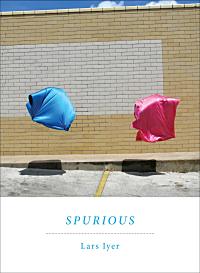


 The Age of Briggs & Stratton
The Age of Briggs & Stratton






































